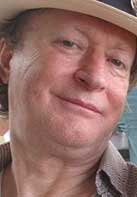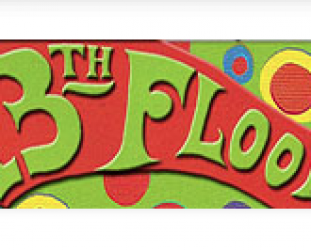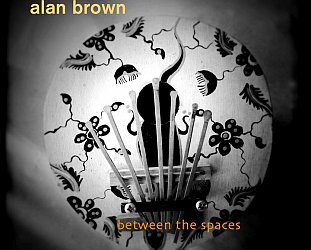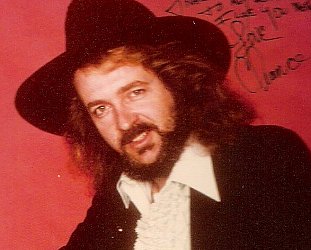Graham Reid | | 8 min read

His arms flail as he says that if we doubted his ability he'd accuse us of being negative thinkers who would rob him of his psychic powers.
And then he stops to quietly perform a piece of magic. It's an old trick, but a good one. With a little gentle rubbing, the silver spoon he is holding bends and finally breaks, just as thousands have down the decades under the steely stare of Israeli psychic Uri Geller.
Marks - more correctly Professor David Marks, of City College in London, and whose day job is teaching health psychology - pulls off Geller's most famous, if largely pointless, trick to perfection.
It's easy, he says. The distractions of the pacing and babbling disguised that, unobserved, he was bending the spoon rapidly to weaken it. When he performed the trick, the spoon then required only the slightest rub and application of pressure for it to bend and break.
Such distraction is a hoary technique of magicians and psychic charlatans, yet people still fall for it - another spoon bent, another convert to the dark side of the paranormal and the world of pseudoscience.
Marks won't have it. As a founder of the New Zealand Skeptics in Dunedin in the early 70s, when he was a senior lecturer in psychology at the University of Otago, Marks has investigated psychics and the paranormal for more than 20 years.
"A hobby which took over," he says, laughing. He can't believe that two decades on he has just revised and updated his 1980 book, The Psychology of the Psychic, originally co-written with fellow Otago academic Richard Kammann.
It's getting harder to be a sceptic about parapsychology, however. There are fewer targets out there. Geller's star has fallen almost below the horizon, the "mind reader" Kreskin (who, like Geller, made his name in the 70s) is now but a footnote in popular culture, and even magician David Copperfield doesn't command the screen time or audience he once did.
Has the world become more sceptical?
"Yes, but when we started work in Dunedin in the 70s almost everybody believed in ESP and clairvoyance,"says Marks. "It comes in waves, and maybe at the moment we've got a bit of a downturn, but a lot of the public believes in the paranormal."
Marks concedes that belief fills a need people have to infer that there is something beyond us, and beyond life and death. It becomes a kind of new religion for many who prefer bizarre and unsustainable explanations for table-tapping or mind-reading, the techniques of which can be taught easily, he says.
So Marks is the grouchy Grinch who tells us there's no Santa Claus?
"Not really, but we need to be more critical about what we believe. There's a role for being sceptical about many things, the paranormal happens to be a nice little target you can focus on. We need to be sceptical about the way Government and our major institutions work, how the police and courts might work, about poverty and the nature of society ... All of these areas contain beliefs and effects that shouldn't happen."
Marks says that when Geller and Kreskin were commanding column centimetres and television time, the media colluded with their pseudoscientific claims because it was in everyone's best interest. The public was curious, their feats sold newspapers and advertising time, and the cloaks of mystique with which the practitioners shrouded themselves made them appear mysterious and interesting. They were a good story - but bad science.
Certainly the media is more analytical today, although the annual bent-spoon award for media gullibility awarded by the Skeptics always finds a recipient. Past winners include the Holmes show, Consumer magazine, the Listener and Country Calendar.
At their annual meeting last weekend, this year's award went to Wellington Hospital for encouraging its nursing staff to claim special healing powers through the laying on of hands.
Briefly back in New Zealand to address the Dunedin conference, Marks makes an amusing, informed advocate for considering the work of psychics and faith healers.
Not only are people today more sophisticated in their understanding, he says, but substantial and better research is being conducted into claims.
"Although some researchers believe they have done lab experiments well and have published their results in good journals, when you analyse them you'll find a number of flaws.
"I'm collaborating with one researcher, Dr Edwin May, of California, who sent me one of his computer programs. I'm going to attempt to duplicate what he did using exactly the same software."
The experiment involves a computer choosing photographs at random from a selection of places. May asserts that people could describe photographs before they were displayed by the computer.
"I'm going to try and replicate that. I'm not going to rule it out until I've tested it."
Marks believes there is nothing wrong with enjoying the work of people such as Kreskin and Geller; the problem lies in the claims they make or those they refuse to deny.
"I love magic. There are some excellent tricks and I've learned a few myself. The magician invites you to suspend critical judgment - and by skill, distraction and diversion gives us a lovely entertainment. When they step off that stage they aren't claiming paranormal powers they've got from a spaceship or a god or whatever.
"That's where people like Geller cross the line. He cloaks it in mystery and mystique and I don't think that's a positive thing in society, to have all these false claims and beliefs, especially if it moves into the area of medicine. And there are a lot of faith healers around who do the same as Geller."
He laughs at the memory of magician Jon Zealando, disguised as a Filipino ``psychic surgeon,'' replicating an act of healing on television during the 70s. Zealando offered a cash award to anyone who could prove conclusively the veracity of psychic surgery. No one collected.
Marks is equally dismissive of some areas of popular belief.
Astrology?
"It's a pseudoscience but I don't think it's taken that seriously. It's re-enforcement for people, generally fairly positive. Astrologers tend to say things people want to hear and there's nothing wrong in giving people a positive view of the future.
"As a psychologist I can see the value in that, but if it's linked with fake beliefs which, if put into practice, cause harm - and I'm thinking in the health context - then that's another matter. If you believe that carrying out a bizarre practice will cure you of some disease or ailment, and that could potentially take you out of the normal medical system, then that's the worry."
ESP and telepathy?
"All the cases I have seen have been proven false. If you take a common example, people will tell you they were just thinking of someone and the phone rang and it was them. Now there could have been background circumstances which caused it but which you overlook. And you don't remember the times you thought something would happen and didn't. So you can't evaluate the actual event, that's why laboratory research is the most important. If scientists can capture it in the lab and repeat it then you have something able to be analysed."
And those tests in the old Soviet Union into parapsychology during the 70s?
"A lot have been proven to be fake now. Much of the research I debunk in the book was funded by the CIA. The researchers and the United States Government believed they were on to something. But another angle is that it was part of the Cold War to give the Russians the idea that they [the Americans] might have had the upper hand in psychic research. It was a propaganda war."
And Geller?
"People got very bored with Geller. His show was about two hours and he did four things and dragged it out. In the original book we looked into the methods of people like Geller and the way their audience reacted. In the new edition I've analysed Geller himself and his motivation.
"I believe he is an unhappy man living behind a shield of silence and secrecy. That must be extremely stressful - a regular magician doesn't have to do that. If someone claims they have these abilities, it must be a difficult illusion to maintain. I think he doesn't believe it because to do what he does you have to know you are cheating.
"But laboratory work in parapsychology reaches most of the criteria for real scientific research. Paranormal research gets analysed more than a lot of other research. I can sympathise with parapsychologists when they say that if other research was looked into as critically as theirs, that research might also be found to be methodologically suspect.
"It's only because they are claiming something so special and out of the ordinary that we focus on them so intensely.
"Extraordinary claims require extraordinary evidence," he says, picking up the broken piece of spoon from the office carpet.





post a comment